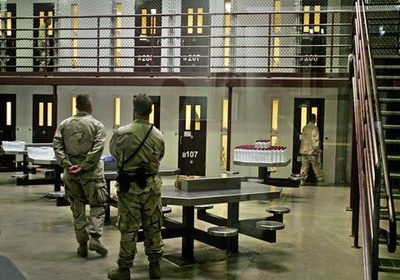The hunger strike at Guantanamo Bay, Cuba has continued to grow to 45 strikers, even as the military got involved over the weekend.
On Saturday, the detention center decided to end communal living and ordered detainees to be placed back into single cells in an effort to stop the hunger strike, according to an article in the Washington Post. Some needed to be forced into their cells, as military guards fired four “non-lethal” rounds at detainees early Saturday morning.
Of the 45 detainees on strike, 13 are currently being force-fed through tubes in order to stay alive. Three have been hospitalized for dehydration. The hunger strike began in early February and prisoners are still refusing any meals provided by the camp. According to a statement by Navy Capt. Robert Durand, spokesman for Joint Task Guantanamo, the shots fired were in response to physical resistance by some detainees, including the use of improvised weapons.
The controversy sparking the hunger strike was the initiation of new, stricter searches of prisoners’ cells and belongings, including their Korans. The military said that the Korans were not handled by the guards but by interpreters, most of whom were Muslim, according to the Washington Post.
Many of the prisoners in Guantanamo Bay have been detained for a decade without trial or sentence.
Pardiss Kebriaei, an attorney for one of the detainees, spoke with the Huffington Post and said that the hunger strikes are part of a larger protest against the entire way the prison is run. “What’s going on now can’t be divorced from the broader context…men who’ve been held for 11 and a half years without charge, who see no end in sight…this is really a way of protesting the uncertainty of the end of their detention,” she said.
“The whole issue is one big gray area,” said Laura Rosales, a sophomore at Boston University studying computer science. “They are prisoners, many of whom actually have committed real crimes, and they’re doing this to themselves. But at the same time if this protest is so widespread, there must be some kind of mistreatment going on.”
These strikes are also a protest against the Obama administration’s halt on efforts to close Guantanamo Bay. The office charged with relocating detainees has been closed by the administration even though about a dozen prisoners were reviewed and cleared for transfer out of the detention facility, the Washington Post reports.
The military hopes that by moving the prisoners out of a communal room, the hunger strike will start to die down from the lack of group pressure. As of now, though, the protest seems to be going strong.
“People in prisons definitely have very innovative and improvised ways of communicating and transferring things and information…so it’s not really surprising that the prison guards would up their security and search measures,” Rosales said. “Maybe, though, they need to address the larger issue instead of just trying to stop the strike. I don’t know the answer, but this strike seems to show that the current policies on Guantanamo aren’t working.”
Photo from cbsnews.com



















